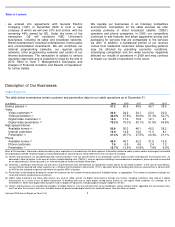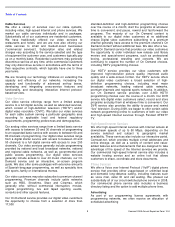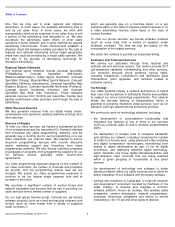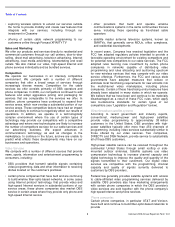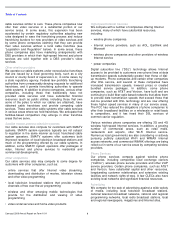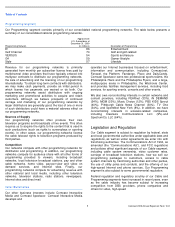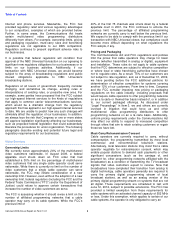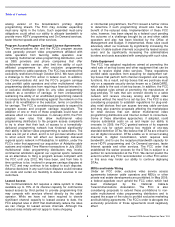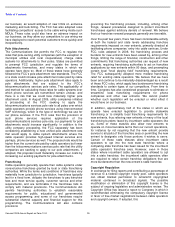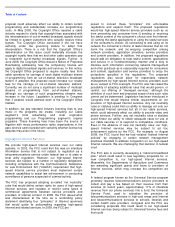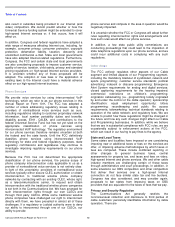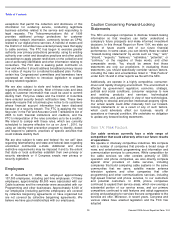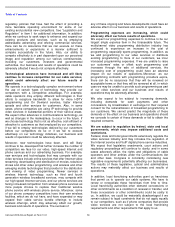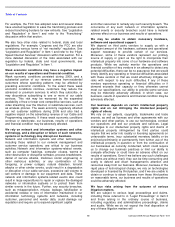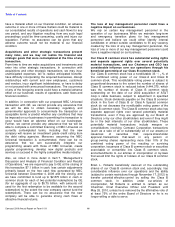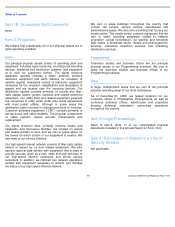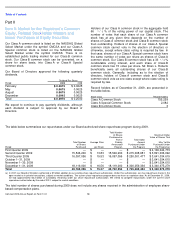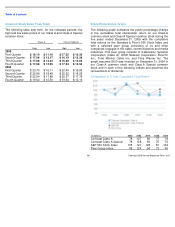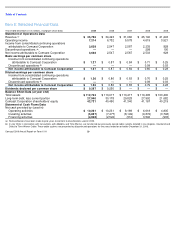Comcast 2009 Annual Report Download - page 16
Download and view the complete annual report
Please find page 16 of the 2009 Comcast annual report below. You can navigate through the pages in the report by either clicking on the pages listed below, or by using the keyword search tool below to find specific information within the annual report.
Table of Contents
proposal could adversely affect our ability to obtain certain
programming and substantially increase our programming
costs. In May 2008, the Copyright Office rejected a cable
industry request to clarify that copyright fees associated with
the retransmission of out-of-market broadcast signals should
be limited to system customers who actually receive those
signals. The Copyright Office concluded it did not have
authority under the governing statute to adopt that
interpretation. There is a risk that the Copyright Office’s
determination on this issue could materially increase the
copyright royalty fees that we and other cable operators pay
to retransmit out-of-market broadcast signals. Further, in
June 2008, the Copyright Office issued a Notice of Proposed
Rulemaking addressing how the compulsory license will
apply to digital broadcast signals and services. In this notice,
the Copyright Office proposed to require royalty fees from
cable operators for carriage of each digital multicast stream
of programming from an out-of-market television broadcast
station. If adopted, this proposal could increase our royalty
fees for the carriage of out-of-market television stations.
Currently, we do not carry a significant number of multicast
streams of programming from out-of-market stations,
although our carriage of such programming streams may
increase in the future. Legislation is pending in Congress
that, if passed, would address each of the Copyright Office
matters.
In addition, we pay standard industry licensing fees to use
music in the programs we create, including our Cable
segment’s local advertising and local origination
programming and our Programming segment’s original
programs. These licensing fees have been the source of
litigation with music performance rights organizations in the
past, and we cannot predict with certainty whether license fee
disputes may arise in the future.
High-Speed Internet Services
We provide high-speed Internet services over our cable
systems. In 2002, the FCC ruled that this was an interstate
information service that is not subject to regulation as a
telecommunications service under federal law or to state or
local utility regulation. However, our high-speed Internet
services are subject to a number of regulatory obligations,
including compliance with the Communications Assistance
for Law Enforcement Act (“CALEA”) requirement that high-
speed Internet service providers must implement certain
network capabilities to assist law enforcement in conducting
surveillance of persons suspected of criminal activity.
The FCC has proposed adopting so-called “net neutrality”
rules that would define certain rights for users of high-speed
Internet services and regulate or restrict some types of
commercial agreements between service providers and
providers of Internet content. In 2005, the FCC issued what
was characterized at the time as a nonbinding policy
statement identifying four “principles” of Internet openness
that would guide its policymaking regarding high-speed
Internet and related services. In 2009, the FCC pro -
posed to convert these “principles” into enforceable
regulations and expand them. The proposed regulations
would bar high
-speed Internet service providers such as us
from preventing any consumer from (i) sending or receiving
the lawful content of the consumer’s choice over the Internet;
(ii) running the lawful applications or using the lawful services
of the consumer’s choice; (iii) connecting to and using on its
network the consumer’s choice of lawful devices that do not
harm the network; and (iv) enjoying competition among
network providers, application providers, service providers
and content providers. In addition, the proposed regulations
would add an obligation to treat lawful content, applications
and service in a nondiscriminatory manner and a duty to
disclose such information concerning network management
and other practices as is reasonably required for consumers
and content, application and service providers to enjoy the
protections specified in the regulations. The proposed
regulations also would allow for reasonable network
management by high-speed Internet service providers such
as us, subject to FCC oversight. The FCC also has raised the
possibility of adopting additional rules that would govern, or
restrict, our offering of “managed services,” although the
definition of such term and proposed scope of any such rules
cannot yet be determined. Legislation has been introduced in
Congress that would impose similar requirements on our
provision of high-speed Internet services. Any net neutrality
rules or statutes could limit our ability to manage not only our
high-speed Internet services but all of our cable services,
which could adversely affect our ability to provide video and
phone services. Further, any net neutrality rules or statutes
could hinder our ability to obtain adequate value for use of
our cable services or to respond to competitive conditions.
Even in the absence of new net neutrality rules, our high-
speed Internet services may be subject to ad hoc
enforcement actions by the FCC. For example, in August
2008, the FCC found that we had violated “federal Internet
policies” by engaging in certain network management
practices intended to address congestion on our high-speed
Internet network. We are challenging that decision in federal
court.
The FCC also is currently developing a “national broadband
plan,” which could result in new regulatory proposals for, or
new competition to, our high-speed Internet services.
Meanwhile, the Departments of Agriculture and Commerce
are awarding significant grants and loans to providers of
Internet services, which may increase the competition we
face.
A federal program known as the Universal Service program
generally requires telecommunications service providers to
collect and pay a fee based on their revenue from their
services (in recent years, approximately 11% of interstate
revenue from our phone services) into a fund, the Universal
Service Fund, used to subsidize the provision of
telecommunications services in high-cost areas and Internet
and telecommunications services to schools, libraries and
certain health care providers. Congress and the FCC are
considering proposals that could result in our high-speed
Internet services being subject to Universal Service fees and
that could



